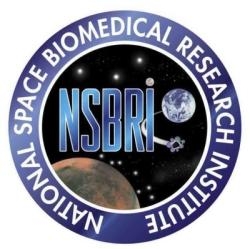One-Year Projects To Study Astronaut Health During Long-Duration Flights
Nine young scientists have received First Award Fellowships from the National Space Biomedical Research Institute (NSBRI). Through this program, they will conduct one year research projects with the eventual aim of protecting astronaut health during long-duration spaceflight.

In addition to receiving mentorship from a faculty member at their home institution, the new First Award Fellows will become members of one of NSBRI's seven science and technology teams. This will allow them to interact with some of the nation's leading researchers in their respective fields and participate in scientific meetings organized by NSBRI, as well as by NASA's Human Research Program (HRP).
"Since the launch of the First Award Fellowship Program twelve years ago, over sixty exceptional young scientists have been trained and successfully transitioned to careers contributing to our nation's human space program," said Dr. Jeffrey P. Sutton, NSBRI President, CEO, and Institute Director. He added "these young scientists have been equipped with skills, experience, a network of colleagues, and the enthusiasm that strengthens the scientific workforce of the future."
The 2015 class of NSBRI First Award Fellows, their institutions, teams, and mentors are:
Austin B. Bigley, Ph.D.; University of Houston
"The Role of Microgravity and Stress-Related Humoral Factors in Dysregulated NK-Cell Function During Spaceflight"
Mentor: Richard J. Simpson, Ph.D.; Radiation Effects Team
David Chesny, Ph.D.; Florida Institute of Technology
"Mitigation of the Spacecraft Radiation Environment Via Magnetic Shielding by an Array of Dispersed Superconducting Magnets"
Mentor: Samuel T. Durrance, Ph.D.; Radiation Effects Team
Walter E. Cromer, Ph.D.; Texas A&M University Health Science Center
"Fluid Shift Associated Lymphostasis of the Gut Induces Inflammation and Microbial Intolerance"
Mentor: David C. Zawieja, Ph.D.; Human Factors and Performance Team
Birendra Mishra, Ph.D.; University of California, Irvine
"Effects of Charged Particles on the Uterus"
Mentor: Ulrike Luderer, Ph.D.; Radiation Effects Team
Marissa J. Rosenberg, Ph.D.; NASA Johnson Space Center
"Characterizing the Recovery of Sensorimotor Performance in Returning Astronauts"
Mentor: Millard F. Reschke, Ph.D.; Sensorimotor Adaptation Team
Saurabh S. Thosar, Ph.D.; Oregon Health & Science University
"Sleep, Physical Inactivity, Circadian Rhythms and Cardiovascular Vulnerability"
Mentor: Steven A. Shea, Ph.D.; Human Factors and Performance Team
Gunes Uzer, Ph.D.; University of North Carolina, Chapel Hill
"Role of LINC Complex in Maintenance of MSC Beta-Catenin Signaling Under Microgravity"
Mentor: Janet Rubin, M.D.; Musculoskeletal Alterations Team
Linnea R. Vose, Ph.D.; New York Medical College
"Protection of Neurogenesis as a Neuroprotectant Strategy for Low-Dose Space Radiation Exposure"
Mentor: Patric K. Stanton, Ph.D.; Radiation Effects Team
Lei Wu, Ph.D.; University of Houston
"Development of Predictive Degradation Models and Determination of Bioequivalence of Pharmaceutical Preparations Contained in the Medical Kits on Board the International Space Station"
Mentor: Diana Shu-Lian Chow, Ph.D.; Smart Medical Systems and Technology Team
Each First Award Fellow receives a stipend as well as additional funds to cover health insurance and travel to meetings organized by NSBRI and NASA's HRP. The Fellows also have the opportunity to attend the Summer Bioastronautics Institute at NSBRI's Headquarters and demonstration laboratories within the BioScience Research Collaborative in Houston, TX.
Since 2004, the NSBRI First Award Fellowship Program has solicited for applications annually, and 63 fellows have been admitted into the program. First Award Fellows have been responsible for 386 peer-reviewed publications, 792 abstracts and presentations, 7 patent/invention disclosures, and 14 book chapters.
(Source: National Space Biomedical Research Institute news release)
 ANN's Daily Aero-Linx (05.02.24)
ANN's Daily Aero-Linx (05.02.24) ANN's Daily Aero-Term (05.02.24): Touchdown Zone Lighting
ANN's Daily Aero-Term (05.02.24): Touchdown Zone Lighting Aero-News: Quote of the Day (05.02.24)
Aero-News: Quote of the Day (05.02.24) ANN FAQ: Contributing To Aero-TV
ANN FAQ: Contributing To Aero-TV NTSB Final Report: Cirrus Design Corp SR20
NTSB Final Report: Cirrus Design Corp SR20



